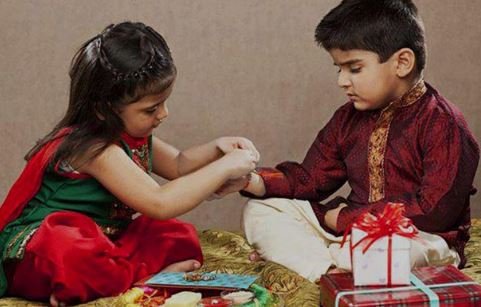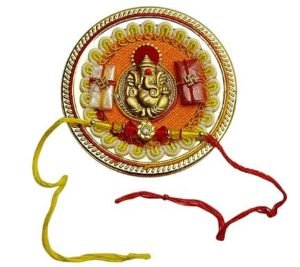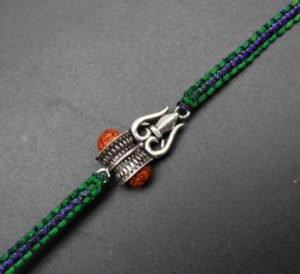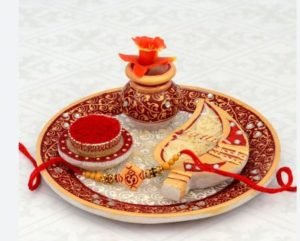Raksha Bandhan :”Bond of Eternal Love and Protection Between Brother-Sister”


Raksha Bandhan also called Raksha Bandhana or Rakhi is one of the Hindu festivals that celebrates the relationship between brothers and sisters, and families.
This bonding between a brother and a sister is very unique and is beyond description in words. This special relationship between siblings is extraordinary and is given importance in every part of the world.
The relationship becomes all the more important in the festival “Raksha Bandhan” dedicated to sibling love.
The term Raksha Bandhan means “Bond of Protection.” It is made up of two words, namely “Raksha” and “Bandhan.”
As per the Sanskrit terminology, the occasion means “The Tie or Knot of Protection” where “Raksha” stands for protection and “Bandhan” signifies the verb to tie.
Together, the festival symbolizes the eternal love of the Brother-Sister relationship which does not mean just blood relationships only. It is also celebrated among cousins, sister, and sister-in-law (Bhabhi), paternal aunt (Bua) nephew (Bhatija), and other such relations.

Raksha Bandhan is observed on the last day of the Hindu lunar calendar month of Shraavana, especially on the full moon called Shravan Poornima. It typically falls in the month of August or September of the Gregorian calendar.
The festival of Raksha Bandhan has been celebrated for some time and there are several stories related to the celebration of this special festival in Hindu scriptures:
According to the ancient legend of Bhavishya Purana, once there was a fierce battle between Gods and demons. Lord Indra- the principal deity of sky, rains, and thunderbolts who was fighting the battle on the side of Gods was having a tough resistance from the powerful demon King, Bali. The war continued for a long time and did not come to a decisive end. Seeing this, Indra’s wife Sachi went to the Lord Vishnu who gave her a holy bracelet made up of cotton thread. Sachi tied the holy thread around the wrist of her husband, Lord Indra who ultimately defeated the demons and recovered the Amaravati. The earlier account of the festival described these holy threads to be amulets which were used by women for prayers and were tied to their husbands when they were leaving for a war. Unlike, the present times, those holy threads were not limited to brother-sister relationships.

As per an account of Bhagavata Purana and Vishnu Purana, when Lord Vishnu won the three worlds from the demon King Bali, he was asked by the demon king to stay beside him in the palace. The Lord accepted the request and started living with the demon king. However, Goddess Lakshmi, wife of Lord Vishnu wanted to return to his native place of Vaikuntha. So, she tied the rakhi around the wrist of a demon king, Bali, and made him a brother. On asking about the return gift, Goddess Lakshmi asked Bali to free her husband from the vow and let him return to Vaikuntha. Bali agreed to the request and Lord Vishnu returned to his place with his wife, Goddess Lakshmi[1].
It is said that the two sons of Lord Ganesha namely, Shubh and Labh were frustrated that they had no sister. They asked for a sister from their father who finally obliged their sister with the intervention of Saint Narada. This is how Lord Ganesha created Santoshi Maa through the divine flames and the two sons of Lord Ganesha got their sister for the occasion of Raksha Bandhan.
Based on an account of Mahabharat, When Krishna injures his finger in battle, Draupadi tears her sari to bandage his wound. Krishna is overwhelmed with gratitude for this act of love and promises to repay her in some way. Krishna keeps his word and valiantly rescues Draupadi in a time of need.
While Draupadi tied a rakhi to Lord Krishna while Kunti tied the rakhi to grandson Abhimanyu before the epic war.
Another legend says that the dead God, Yama did not visit his sister Yamuna for a period of 12 years who ultimately became very sad. On the advice of Ganga, Yama went to meet his sister Yamuna who was very happy and performed hospitality to her brother, Yama. This made the Yama delighted who asked Yamuna for a gift. She expressed her desire to see her brother again and again. Hearing this, Yama made his sister, Yamuna immortal so that he could see her again and again. This scriptural account forms the basis of a festival called “Bhai Dooj” which is also based on the brother-sister relationship.

The main purpose of the Raksha Bandhan ceremony is to renew and strengthen the filial bond of peace and love.
Prior to the ceremony, before the sun rises, the sister collects a number of things needed for the Raksha Bandhan on a large plate are called Thali.
First, all members of the family make offerings to their deities. Then, as she ties the Rakhi on her brother’s wrist, the sister chants a prayer and marks his forehead with Kumkum powder. She prays for his health and he returns the sentiment by vowing to protect her.
During the ceremony, sacred verses from Hindu scriptures are also spoken.
Once the sister has tied the Rakhi, she traditionally places something sweet in her brother’s mouth. In return, he presents her with a gift.
The sentiments of Raksha Bandhan make it a jubilant time. It is common to give cards, sweets, flowers, or small presents to family and friends. Nowadays, a theme party is also being thrown for Raksha Bandhan.
Have a Blessed and Joyful Raksha Bhandhan!!!
[1] What is Raksha Bandhan, Why do We Celebrate Rakhi Festival (fnp.com)
DISCLAIMER: The author is solely responsible for the views expressed in this article. The author carries the responsibility for citing and/or licensing of images utilized within the text.
